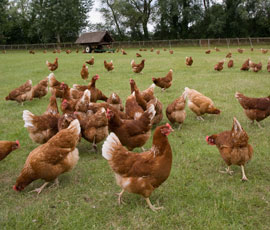Free range ‘not necessarily higher welfare’

Free-range systems do not necessarily equate to good hen welfare, David Burch of Octagon Services, Berkshire, has written in the Veterinary Record journal.
Mr Burch cited a Bristol University study which found both hen mortality and variability were significantly lower in caged systems when compared with barn, organic or free range.
Researchers used records of dead-on-arrival birds collected by the Meat Hygiene Services at five slaughterhouses in 2009, derived from nearly 1,500 flocks.
The study found that mortality over a 52-week laying period was 5.39% in caged hens, compared with 9.52% in free range, 8.68% in organic and 8.55% in barn systems.
“This should not be of any great surprise,” wrote Mr Burch. “The reasons hens were moved into cages were, first, to facilitate intensification of production, but also to remove the hens from direct faecal-oral contact.”
Mr Burch also noted that the research was carried out before the conventional cage ban came into force on 1 January 2012. Of the 375 cage systems recorded, only 16 were enriched.
But anecdotal evidence from vets in the field has suggested that these new colony systems, housing birds in groups of about 60, have performed just as well as conventional cage units in terms of mortality, but with greater variation.
“Although flocks have been described as calmer, there can be outbreaks of cannibalism. Infections such as mycoplasma species and escherichia coli appear to spread through the colony more quickly and severely if outbreaks occur,” said Mr Burch.
“Otherwise, the system is working well and the birds have good feather cover, good body condition and better health, which may help with reducing transport mortality.”
Mr Burch said that all systems, if well managed and disease-free, could have a low mortality. “Systems that have outdoor access have additional management difficulties, which makes the responsibilities of management even greater if they truly want to be considered more ‘welfare friendly’.”
To learn more about bird health and welfare, look out for our special report in February’s issue of Poultry World. Subscribe online to secure your copy.
